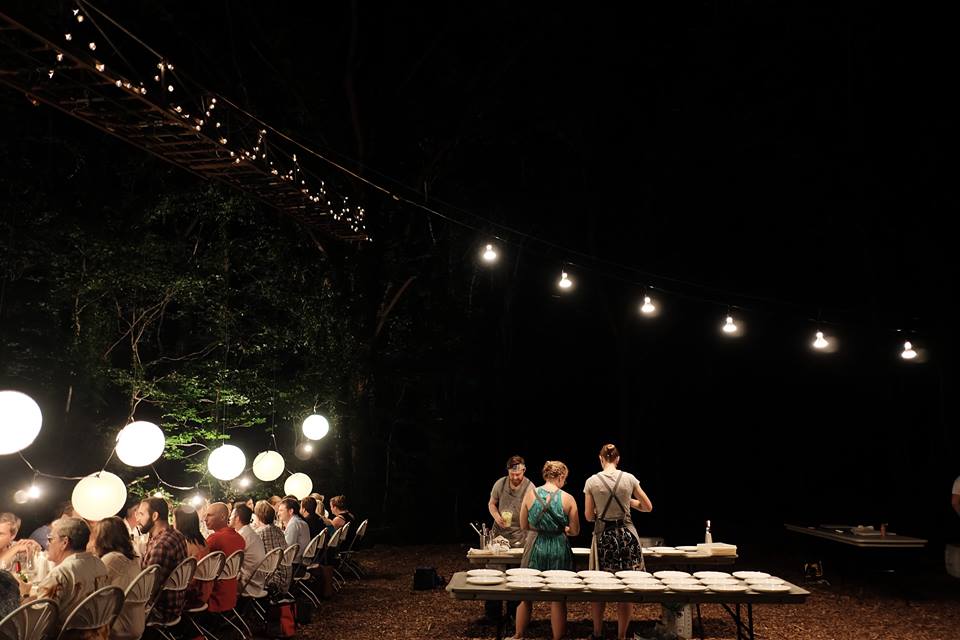Supper clubs provide dining alternatives to traditional restaurants in the Upstate of South Carolina, North Carolina, and East Tennessee
By Abby Deering
Photographs courtesy of supper clubs
Farm-to-table? How about putting the table in the middle of the farm. In the Winter 2016 Issue, we unveiled the unique dining experiences of the South Carolina Low Country. In this issue, we’ve traveled north to explore the culinary adventures of the Upstate, North Carolina, and East Tennessee, where supper clubs are less underground, more mountaintop.
As in Charleston, the ad hoc nature of these usually clandestine events allows chefs a range of invention not possible within the confines of the traditional restaurant. Flexibility begets freedom begets creativity. Chefs can cook whatever they want. And herein lies the real secret of these so-called secret supper clubs: the savviest of diners know that’s what they want too.
SNAP PEA UNDERGROUND
The Triangle, N.C.
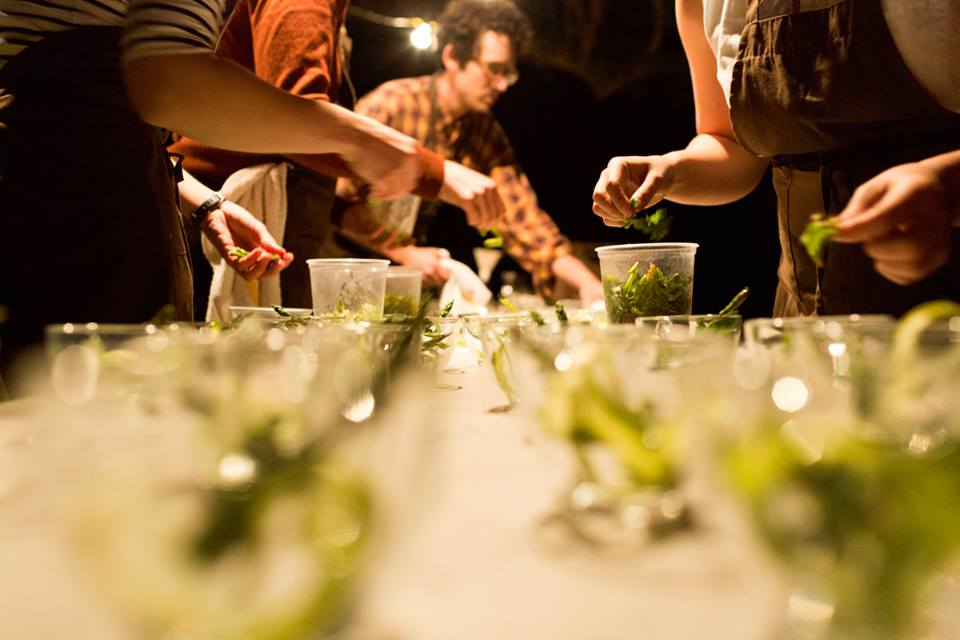
The time is midday on a Friday and it’s boots on the ground. The team moves quickly, transporting 50 gallons of water, 500-pound stoves, thousands of feet of extension cable, generators — everything and the kitchen sink — deep into the forest. The group’s fearless leader, Jacob Boehm, gingerly scurries across the ladder of a vintage fire truck, carefully hanging lanterns over the table set below. This is Snap Pea Underground.
What will follow are three seatings (Friday, Saturday, Sunday) of a 10-course meal and then, in a snap, the team will disband, leaving no trace behind.
A music major at Stanford and avid world traveler, Boehm worked in kitchens and restaurants across the country (including the renowned Pok Pok in Portland), eventually returning to his home state of North Carolina and starting Snap Pea Underground.
The tickets go on sale, and snap, they are sold out in two minutes or less. An email is sent out 24 hours before the event with the exact location and instructions ( “all attendees must be able to do some off-road walking”).
Boehm is constantly following up leads for wild and whimsical locations: the banks of the historic Haw River, a VW restoration shop, the top floor the Hunt Library overlooking Raleigh, an abandoned fruit and produce warehouse in downtown Durham.
His multi-course menus weave in concepts that are often site-specific, contextualizing either the time or place of the dinner. At a local denim factory, each of the nine courses represented a different part of the fabrication process — grow, pick, gin, spin, dye, weave, cut, sew, finish.
Boehm is no doubt a provocateur and likes to do things with food that takes people by surprise; he’s an educator, making people think about food in new ways. Drawing from his close network of farmers — all within a roughly 30-mile radius — Boehm is constantly thinking, “Who are the cool producers doing interesting things and how can I incorporate them?”
Boehm is part of a bold new generation proving that you don’t need to go to culinary school or train in a Paris kitchen for 20 years to be a chef. Scratch the overhead, keep it lean and mean, and with enough gumption, talent, and imagination, you can make just about anything happen.
CHICKEN WIRE N.C.
The Triangle, N.C.
Chef Regan Stachler of Little Hen Restaurant likes to joke that he was the only 6-year-old boy with an Easy-Bake oven. Today he is a man that will readily tell you he doesn’t eat to live; he lives to eat. He’ll also tell you creativity is infectious. After attending two delicious yet distinct pop-up dinners from the Blind Pig Supper Club, he thought: “Why don’t I do this?” He scrolled through his contacts — it helps when you can count among your friends Sean Fowler, chef-owner of Mandolin, and John Childers, executive chef at Midtown Grille and former Herons chef-de-cuisine — fired off a few texts, and before he knew it, Chicken Wire NC was hatched.
Three years later, and Chicken Wire NC continues to bring together chefs from the Triangle “to engage in a shared desire for culinary high jinks.” The only way to truly know what happens at these dinners is to go yourself — if you’re lucky enough to get a ticket. The group is pretty tight-lipped and its guests held to a strict honor system: “Honor the unwritten supper club rules, honor the private location. What happens at a Chickenwire dinner, stays at the Chickenwire dinner.”
THE BLIND PIG SUPPER CLUB
Asheville and Raleigh-Durham, N.C.
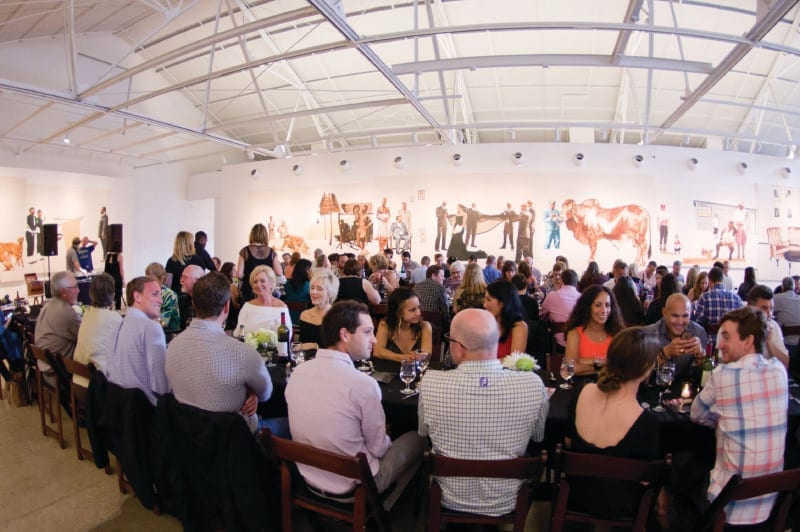
The Blind Pig Supper Club in North Carolina is a communal culinary-anthropology experience, exploring the connections of food and history.
It’s the dead of winter, and a 138-year-old Appalachian dairy farm glows like a burning ember against the mountain sky. Inside, guests are seated at three long communal tables. Well, not everyone is seated. Some folks dance between the tables as the DJ spins records. Paintings on brown butcher paper created by local artist Andy Herrod decorate the barn walls and bushels of fragrant herbs hang from the beams. Asheville chefs Brian Canipelli of Cucina 24 and Drew Maykuth of The Admiral join Blind Pig Supper Club chef-founder Mike Moore. What are they preparing? A traditional 12-course Japanese washuko meal, of course.
Led by husband-and-wife team Mike and Darlene Moore, The Blind Pig Supper Club is a group of food lovers and artisans who weave stories, history, and art into the production of stellar experiences. They engage in something they call culinary anthropology, exploring how history and food connect us as a community. Tonight’s dinner is part of a project about Southern Appalachia, and proceeds go to the Appalachian Sustainable Agriculture Project of WNC. (Every BPSC event supports a local charity.)
Started in 2011 in Asheville, BPSC is easily the longest-running supper club in the Southeast, inspiring the creation of others in the region (see Chicken Wire NC, also appearing on this list).
CYCLE TO FARM
Asheville, N.C.
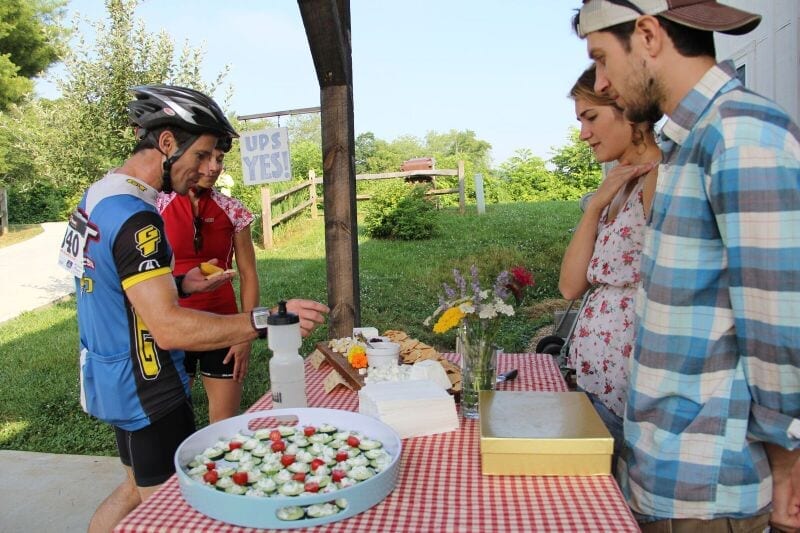
Cyclists stop to sample food provided at a rest stop during a 62-mile route of a Cycle to Farm event.
Cycle To Farm isn’t a supper club; it’s a movable feast — an organized cycling event that pedals through North Carolina’s majestic mountains and bucolic farmland. Along the challenging 62-mile route, riders stop every 10 to 15 miles at farms to refuel and sample items the farmers produce.
“Cyclists and farmers share many things in common: they are subject to all types of weather, their passion requires discipline and hard work, they often get sweaty and dirty,” says founder Jen Billstrom. “My event brings their worlds together in a meaningful way. Cycling makes you hungry. Farmers fill your belly. Cycle. Eat. Repeat”
Purchased farm products are brought ahead by volunteers to the finish where an after-party, complete with a farm-to-table meal and craft beer, awaits.
A unique and fun form of agri-tourism, Cycle-to-Farm makes a big impact on the community, providing a source of income for local farmers and artisans and raising funds for greenways “so that all types of cyclists — avid to beginner — can enjoy our community on two wheels,” Billstrom explains.
And then, of course, there’s the impact on the participants — the sense of achievement at crossing the finish line. Billstrom recalls past rider-diners: “The mother of four small children who went for training whenever she could fit them into her hectic schedule, the 83-year-old attorney who took up the sport of cycling when tired of playing golf; the empty-nest mother who started cycling to have some common ground with her college-age son.”
THE NEXT SUPPER: UNDERGROUND DINING COLLECTIVE
Greensboro, N.C.
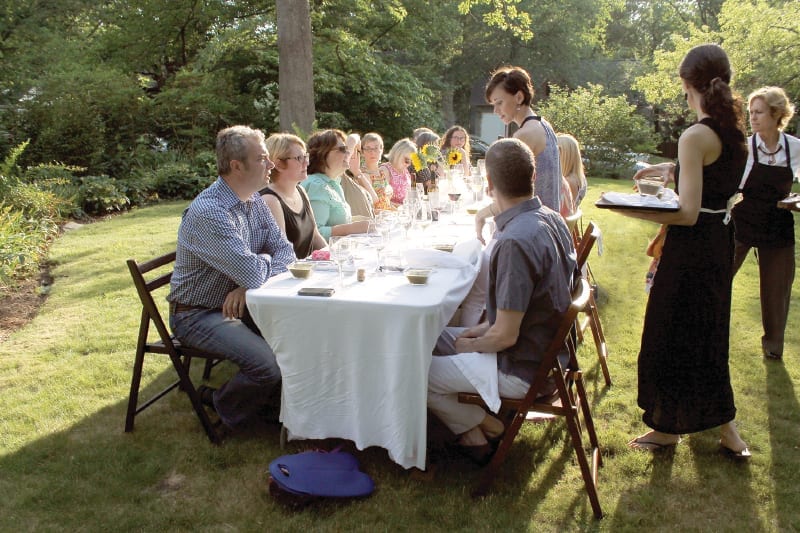
Participants gather for a communal dining experience from The Next Supper: Underground Dining Collective.
Longtime friends and restaurants ex-pats Kerrie Thomas and John Jones have brought the magic of hush-hush supper clubs to Greensboro, NC. The Next Supper is a roving underground experience with a twist — the menu is largely vegetarian. Largely, but not entirely. Jones is an omnivore. “John will send me his menu ideas, they’ll collide with mine, and I’ll write a menu that hopefully ties it all together,” Thomas explains. Ultimately, Thomas says she’s driven by “a desire for better vegetarian cuisine” and wants to “promote the notion that vegetarian cuisine could be as satisfying as any meat-centric.”
To date, there have been over 70 suppers in settings as exceptional as the multi-course meals that have been served. Private locations have included the spectacular Levy’s Lowenstein House, an architectural treasure in Greensboro; and the garden at Alice Water’s Edible School Yard at the Greensboro Children’s Museum.
BLACKBERRY FARM
Walland, T.N.
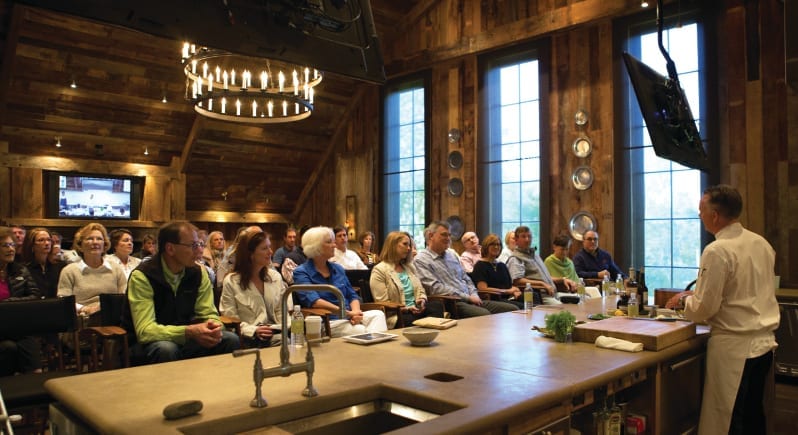
Guests attend a cooking school during their stay at Blackberry Farm in Walland, Tennessee.
Nestled in the foothills of the Great Smoky Mountains, Blackberry Farms sits on 4,200 picturesque acres. The resort is a luxury sleep-away camp for city slickers — a pastoral playground offering a wide range of activities. With so many options, it can be hard to choose. Reserve a convertible from the fleet of Lexuses for a jaunt into town or take the Harley Davidson for a mountain road spin? For kids, “class” offerings compete with the curricula (and tuitions) of even the most precocious liberal arts schools, from stream ecology to horse hints to geocaching.
The Relais and Chateau retreat is home the Wellhouse spa, a 12,000-square-foot, state-of-the-art sanctuary. But for those who’d rather roll up their sleeves than be pampered all day, the backdrop to all of this luxury and leisure is a working farm with a rare collection of artisans — chef, baker, cheese maker, forager, butcher, brewer. Guests can join master gardener John Coykendall (a human compendium of seed knowledge and history) and work in the fields, harvesting the day’s produce for the kitchen and even shelling seeds. At the end of the day, the fruits of their labor can be enjoyed in one of the three James Beard Award-winning restaurants. Blackberry Farm is famous for its “Foothills Cuisine,” which combines haute cuisine and foods indigenous to its Smoky Mountain heritage.
RENEGADE VITTLES
Greenville, S.C.
After ritzy careers in Los Angeles and New York, a return to the Carolina Piedmont was the obvious next step for Chef Joe Clarke and sommelier Darlene Mann-Clarke. Together they opened the nationally acclaimed American Grocery Restaurant in 2011. Chef Clarke, a Spartanburg native, draws inspiration from days spent on his grandmother’s Upstate farm, bringing a sophisticated flair to traditional fare. Most would be satisfied by running one of Greenville’s hottest restaurants, but not this powerhouse couple. Next on the agenda? Pioneer the city’s first underground supper club, Renegade Vittles. Like all good underground supper clubs, the locations of the communal-style dinners are shrouded in secrecy until 24 hours before the event. The only constants are a clever theme, whimsical location, and an all-star lineup of guest chefs, but no other details are provided beforehand. This doesn’t deter Upstate diners in-the-know, who are quick to snatch up tickets. E

